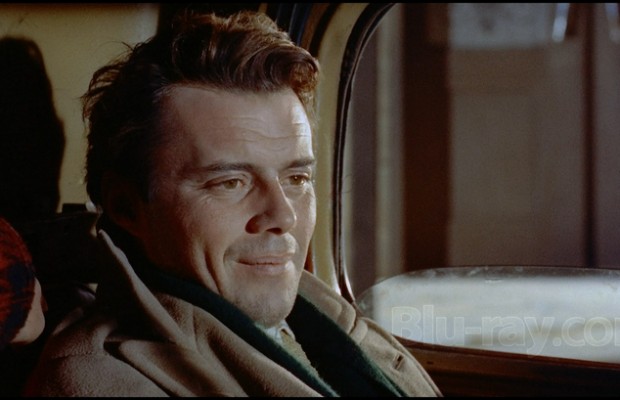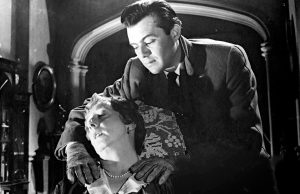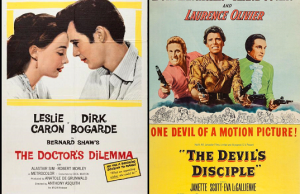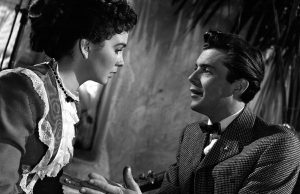Campbell’s Kingdom (1957)
By Toronto Film Society on February 21, 2014
Toronto Film Society presented Campbell’s Kingdom on Sunday, October 6, 2013 in a double bill with The Desperadoes, as part of the Season 66 Sunday Afternoon Film Buff Series, Programme 1.
Director Ralph Tomas made a rare foray into the Western genre with Campbell’s Kingdom, a 1957 box-office hit in England. Starring Dirk Bogarde, a matinee idol often dubbed the  British Rock Hudson, the picture dazzled audiences by combining stunning location shooting in the Canadian Rockies with an action-packed narrative.
British Rock Hudson, the picture dazzled audiences by combining stunning location shooting in the Canadian Rockies with an action-packed narrative.
Box-office success was nothing new to Ralph Thomas, particularly when teamed with producer Betty E. Box, with whom he would make 32 films between 1950 and 1979. With an unerring eye for talent and good stories Betty E. Box had earned the nickname “Betty Box Office,” particularly in 1954, when she stumbled across a comic novel about a young doctor and cast rising star Dirk Bogarde in the leading role The result, 1954’s Doctor in the House, was a box-office triumph that would lead to decades of sequels, three of them featuring Bogarde in the role that made him England’s top box-office star.
Campbell’s Kingdom was part of a master plan to build Bogarde’s popularity with movie audiences. Thomas, Box and Bogarde all worked for the J. Arthur Rank studios, where chief accountant John Davis had decided to personally supervise Bogarde’s career. After the actor’s success in the first three “Doctor” films and a series of dramas and comedies, Davis wanted him to expand into action roles and prestige projects like the remake of A Tale of Two Cities (1958). For starters, Bogarde would travel to Canada to star in his first Western.
 Action stardom was hardly a natural choice for Bogarde. Although, like Hudson, he had a devoted female following who never suspected he was gay, he did not share Hudson’s athletic prowess. Even though the studio gave him barbells and ordered him to work out, he remained, in his own words, “scrawny as a plucked chicken.” He got around that by wearing two sweaters under his costumes for Campbell’s Kingdom to create the illusion that he had a more developed torso.
Action stardom was hardly a natural choice for Bogarde. Although, like Hudson, he had a devoted female following who never suspected he was gay, he did not share Hudson’s athletic prowess. Even though the studio gave him barbells and ordered him to work out, he remained, in his own words, “scrawny as a plucked chicken.” He got around that by wearing two sweaters under his costumes for Campbell’s Kingdom to create the illusion that he had a more developed torso.
Davis’s plan proved successful, and Bogarde continued as England’s reigning male star for ten years. But over time, his success in popular fare like Campbell’s Kingdom proved a straightjacket. Box, Thomas and the studio were so committed to providing little more than entertainment that they turned down most of Bogarde’s more ambitious ideas. Despite his  urgings, they would pass on the film version of John Osborne’s searing play Look Back in Anger, which would go to Richard Burton, and Alan Sillitoe’s working-class novel Saturday Night and Sunday Morning, which helped make Albert Finney a star. To make matters worse, even though the studio was usually accommodating to Bogarde’s requests to do plays between films, his rising popularity made theatre work impossible. Mobs of adoring fans disrupted performances by screaming at his every entrance and, at one point, pushed their way through locked doors to stampede backstage.
urgings, they would pass on the film version of John Osborne’s searing play Look Back in Anger, which would go to Richard Burton, and Alan Sillitoe’s working-class novel Saturday Night and Sunday Morning, which helped make Albert Finney a star. To make matters worse, even though the studio was usually accommodating to Bogarde’s requests to do plays between films, his rising popularity made theatre work impossible. Mobs of adoring fans disrupted performances by screaming at his every entrance and, at one point, pushed their way through locked doors to stampede backstage.
Ultimately Borgarde’s dissatisfaction with his artistic prospects at Rank would lead him to leave the studio in pursuit of more ambitious roles. With his departure, Box and Thomas would promote on of his Campbell’s Kingdom co-stars, Michael Craig, to the leading role in the “Doctor” series.
Notes by Peter Poles
You may also like...
-
News

Frances Blau
Toronto Film Society | February 27, 2024On Monday, February 26th, 2024, Toronto Film Society lost longtime friend, supporter, and board member Frances Blau. Known for her sense of humour, her love of film, her generosity,...
-
Special Events

Monday Evening Film Noir Double Bill at the Paradise Theatre
Toronto Film Society | July 8, 2024The Toronto Film Society presents a film-noir double feature at one low price! The Window (1949) in a double bill with Black Angel (1946) at the Paradise Theatre on Monday, August...
Programming

Virtual Saturday Night at the Movies
Toronto Film Society | July 20, 2024Toronto Film Society is back in the theatre! However, we’re still pleased to continue to bring you films straight to your home! Beginning Season 73 until now we have...
4-
 Toronto Film Society | July 8, 2024
Toronto Film Society | July 8, 2024
Monday Evening Film Noir Double Bill at the Paradise Theatre
-
 Toronto Film Society | November 6, 2022
Toronto Film Society | November 6, 2022
-
 Toronto Film Society | August 1, 2023
Toronto Film Society | August 1, 2023
Donate to Toronto Film Society – We’re now a Registered Charity!
-
Copyright © 2017 Toronto Film Society.




Leave a Reply